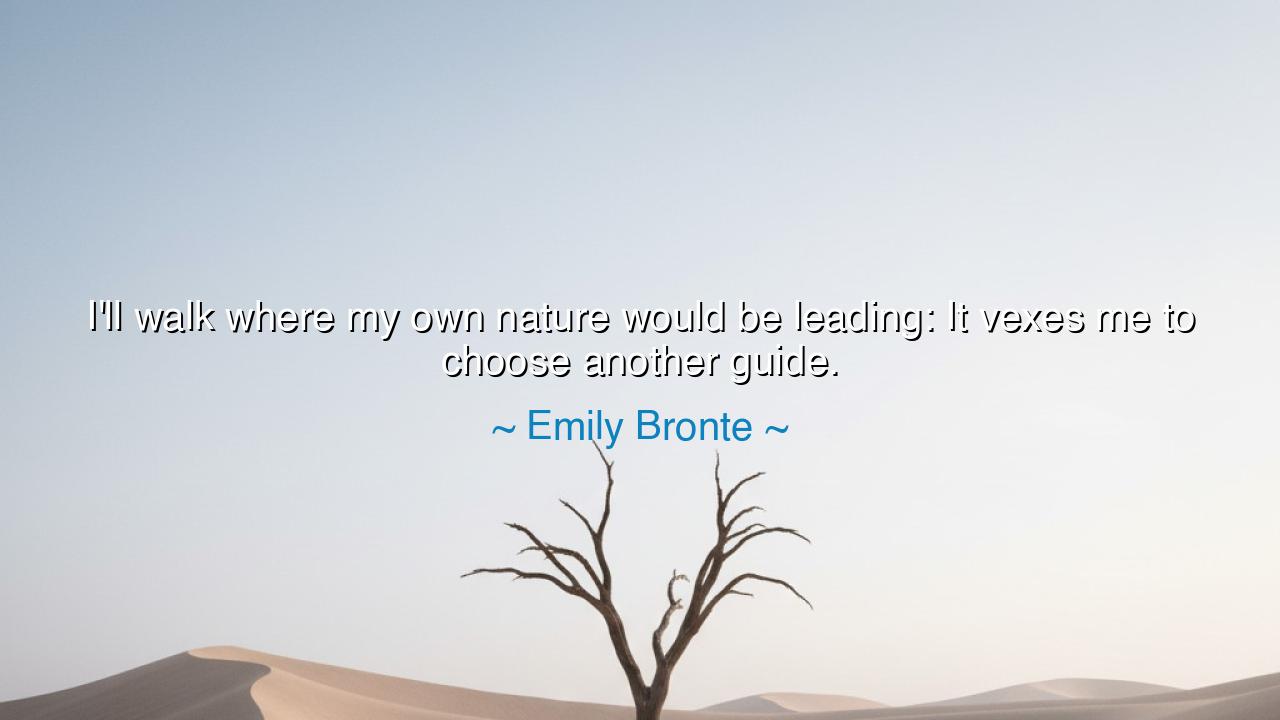
I'll walk where my own nature would be leading: It vexes me to






Hear the fierce words of Emily Brontë: “I'll walk where my own nature would be leading: It vexes me to choose another guide.” In this utterance, she gives voice to the spirit of independence, the cry of the soul that refuses to be bound by the expectations of others. To walk where one’s own nature leads is not the easy path, nor the safe one, but it is the only path where truth and authenticity are found. To follow another’s guide against one’s will is to live as a shadow, while to follow one’s own nature is to live as fire.
Brontë’s defiance arises from the soil of her own life. She lived in a time when women were expected to obey, to remain quiet, to submit themselves to the authority of fathers, husbands, and society. Yet she, like her sisters, refused to walk that prescribed road. In her poetry and her novel Wuthering Heights, she embraced the raw and untamed forces of passion, freedom, and individuality. Her words are not mere poetry, but a testimony: that she would rather face solitude and hardship than surrender her will to another’s dictates.
To say “It vexes me to choose another guide” is to express the torment of the soul forced to betray itself. History shows us this pain in countless lives. Consider the fate of Galileo Galilei, who was pressed by the powers of his age to abandon his vision of the stars. Forced to recant, he outwardly bowed, but his heart was vexed, for he knew the truth within him. Though silenced, he whispered, “E pur si muove”—and yet it moves. Like Brontë, Galileo knew the torment of walking by another’s guide when his own nature pointed to the heavens.
But we also see the triumph of those who followed their nature without compromise. Think of Joan of Arc, a young girl who heeded her inner voices rather than the authorities who told her she was unfit, unworthy, or insane. She walked where her nature led her—into battle, into fire, into immortality. Though her body was destroyed, her spirit remained unconquered, a living testament to Brontë’s declaration that true dignity comes not from obedience, but from fidelity to the self.
The deeper meaning of Brontë’s words is this: that the greatest tragedy is not failure, but betrayal of one’s own essence. A man or woman may stumble, may fall, may endure hardship, but if they remain true to their nature, they are noble. Yet to succeed while denying oneself is to win a hollow crown. The vexation she speaks of is the gnawing grief of living another’s life while one’s own waits untrodden.
The lesson, therefore, is clear: trust your nature. This does not mean indulging every whim, but listening to the quiet voice of your inner truth—the calling that tells you who you are and where you must go. Do not silence it for the sake of pleasing others, nor bury it under fear. Seek mentors, yes, but not masters who extinguish your flame. Let your guides be companions, not captors. Walk the road of your own soul, even if it is lonely, for it is better to stumble in freedom than to march in chains.
So I say to you: remember Emily Brontë’s courage. “I’ll walk where my own nature would be leading.” Let it be your anthem when the world demands you conform, when others try to bend your will. Live so that your steps echo the truth of your being, and let no vexation torment you for betraying yourself. For in the end, the path of authenticity is the only path that leads to peace, and the only journey worthy of a free and noble soul.






AAdministratorAdministrator
Welcome, honored guests. Please leave a comment, we will respond soon